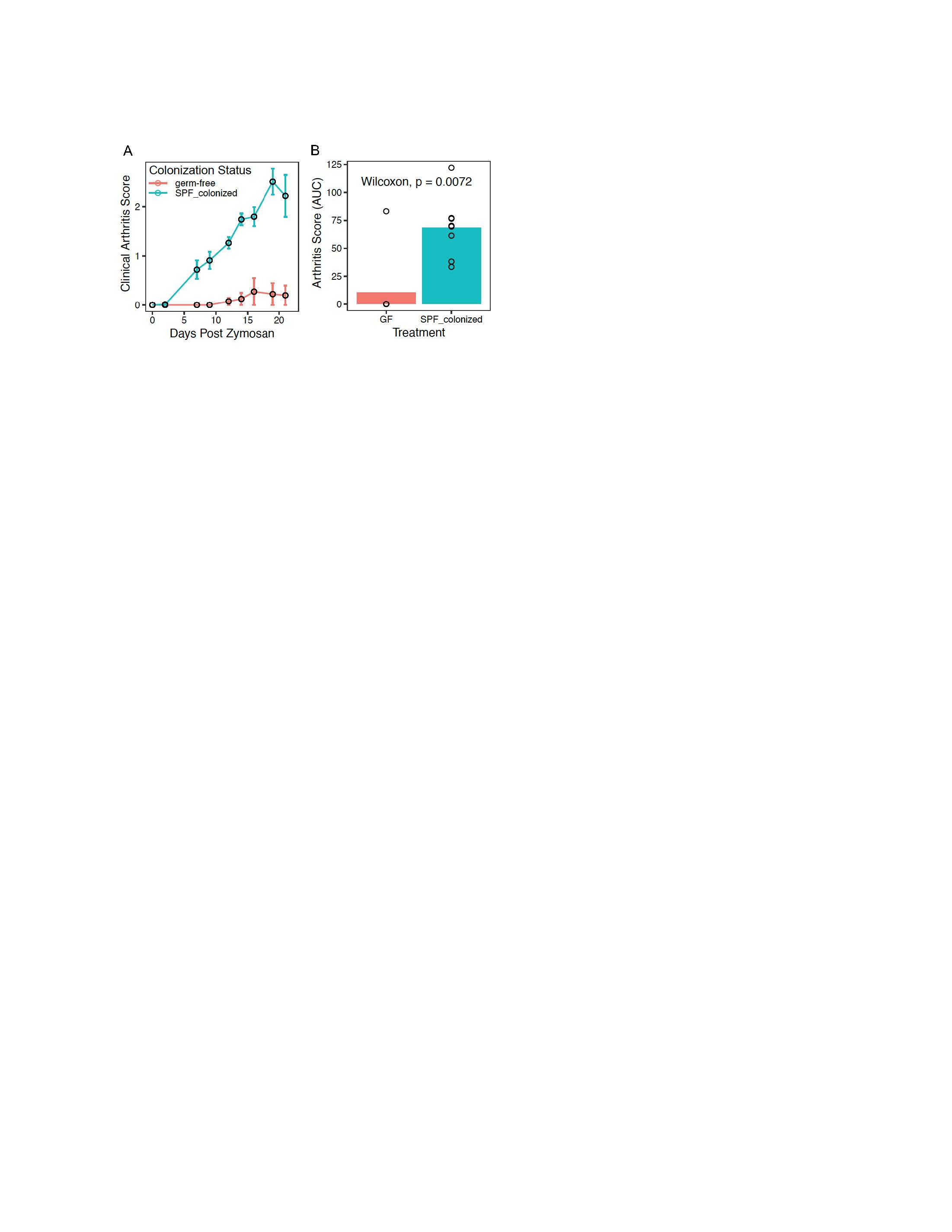Session Information
Session Type: Poster Session A
Session Time: 10:30AM-12:30PM
Background/Purpose: Dysbiosis of the gut microbiota has been linked to rheumatoid arthritis (RA), but it remains unclear whether these microbial alterations are causal or secondary to inflammation, as most patients present after disease onset. The SKG mouse, which develops CD4⁺ T cell–driven autoimmune arthritis resembling RA including erosive joint disease, rheumatoid factor (RF) and anti-citrullinated protein antibodies (ACPAs), and pneumonitis, providing a tractable model to dissect these relationships. Under germ-free (GF) conditions, SKG mice fail to develop arthritis, underscoring the requirement for microbial cues in disease initiation. This model enables dissection of microbiota-dependent versus genetically encoded immune mechanisms, including the largely unexplored gut–thymus axis. We investigated how commensal microbes influence thymic selection, peripheral T cell activation, and tolerance to endogenous antigens.
Methods: GF SKG mice (n=8) and conventionalized GF SKG mice (n=9) received intraperitoneal zymosan injections, and arthritis scores were monitored over time. Clinical scores were assessed blindly, and cumulative disease burden was calculated as area under the curve (AUC); group differences were analyzed using the Wilcoxon test. Immune cell populations in thymocytes, peripheral lymphoid organs and Peyer’s patches were analyzed by flow cytometry using FlowJo software, and group comparisons were made using Student’s t test. Thymocyte subsets and T cell signaling in thymocytes and peripheral CD4⁺ T cells were assessed using calcium flux and phospho-flow cytometry.
Results: Only 1 GF SKG mouse developed arthritis, compared to all 9 conventionalized GF SKG mice, which showed significantly higher disease activity (Fig. 1). Conventionalized mice exhibited a significant expansion of T follicular helper (Tfh) cells and a significant reduction in regulatory T cells in Peyer’s patches (both p < 0.001). In zymosan-free conditions, GF SKG mice showed reduced frequencies of mature CD4⁺ single-positive (SP4) thymocytes despite normal levels of CD4⁺CD8⁺ double-positive cells, indicating intact positive selection but enhanced negative selection. Thymocytes from GF SKG mice expressed higher CD5, consistent with increased tonic TCR signaling. Accordingly, SKG SP4 thymocytes and peripheral CD4⁺ T cells from GF mice exhibited more robust signaling responses upon stimulation than their SPF counterparts.
Conclusion: Microbial cues are essential for permissive arthritis in SKG mice and shape both thymic selection and peripheral T cell activation. The enhanced signaling responses in GF-derived T cells, despite reduced basal signaling markers, suggest an unrecognized role for the gut–thymus axis in setting thresholds for T cell reactivity. This model offers a unique opportunity to define how commensals calibrate T cell selection and autoimmune potential.
 Figure 1. Microbiota are required for arthritis development in SKG mice.
Figure 1. Microbiota are required for arthritis development in SKG mice.
Germ-free (GF) SKG mice (n=8) and conventionalized GF SKG mice (n=9) were injected intraperitoneally with zymosan and monitored over time for clinical arthritis scores in a blinded fashion. (A) Blinded longitudinal arthritis scores are shown for each group. (B) Cumulative disease burden, measured by area under the curve (AUC) of arthritis scores, was significantly higher in conventionalized mice (Wilcoxon test, p = 0.0072).
To cite this abstract in AMA style:
Patel A, yu S, Nakao Y, Mukherjee M, Orellana D, Scher J, Turnbaugh P, Nayak R, Ashouri J. Microbial Cues Promote Arthritis and Alter T Cell Selection in SKG Mice [abstract]. Arthritis Rheumatol. 2025; 77 (suppl 9). https://acrabstracts.org/abstract/microbial-cues-promote-arthritis-and-alter-t-cell-selection-in-skg-mice/. Accessed .« Back to ACR Convergence 2025
ACR Meeting Abstracts - https://acrabstracts.org/abstract/microbial-cues-promote-arthritis-and-alter-t-cell-selection-in-skg-mice/
